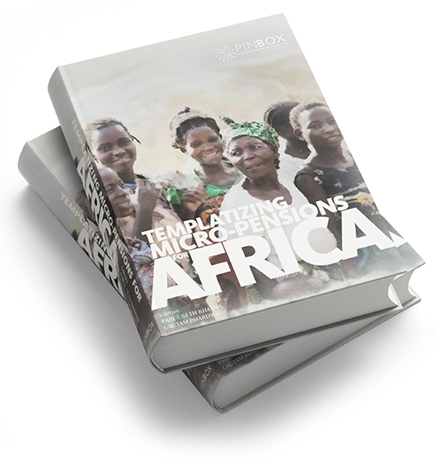pinBox Africa

Book Project: Templatizing microPensions for Africa
Nearly 30 leading pension policymakers, regulators, DFS ecosystem stakeholders and researchers have collaborated with pinBox to develop this book edited by Gautam Bhardwaj and Parul Seth Khanna . pinBox will release this volume at a global policy-roundtable in mid-2023 in collaboration with the Africa Pension Supervisors’ Forum. The book and associated dissemination efforts are expected to foster collaborative and cooperative efforts on pension inclusion and help develop a replicable digital model that will make saving for old age easy and simple for each excluded worker in each African nation.

 Rwanda
Rwanda
Digital micro-pension feasibility study
In 2016, pinBox assisted Access to Finance Rwanda (AFR) and Rwanda’s finance ministry (MINECOFIN) to conduct a demand and supply-side assessment and ascertain the feasibility of introducing a digital micro-pension program for Rwanda’s informal sector workers.
Launch of Rwanda’s National Long-term Savings Scheme
Between 2017 and 2018, a 9-member multi-disciplinary team from pinBox and MasterCard worked with Access to Finance Rwanda (AFR), the Rwanda finance ministry and the Rwanda Social Security Board (RSSB) to help design and implement EjoHeza -- Rwanda’s new Long Term Saving Scheme (LTSS). In 2019, Rwanda became the first country in Africa to adopt the pinBox digital micro-pension model. It is also the first African nation to introduce a government-sponsored, national-ID linked digital micro-pension and insurance program based on fiscal incentives for informal sector workers. Today, the scheme has achieved over 2.4 million voluntary subscribers (half of whom are women) and an AUM of over RwF 40 billion.
 Uganda
Uganda
Micro-pension framework assessment
In 2017, pinBox worked with Financial Sector Deepening (FSD) Uganda and the Uganda Retirement Benefits Regulatory Authority (URBRA) to assess Uganda's micro-pension regulatory framework and the sustainability and scalability of two new micro pension schemes.
Feasibility for expanding voluntary pension coverage to informal workers
In 2018, pinBox worked with The World Bank to design a strategy and an operating model to expand pension coverage to Uganda's 11 million informal sector workers.
Implementation Blueprint for Uganda’s Digital Micro-pension Scheme
In 2021, pinBox assisted URBRA in developing the blueprint for a secure, sustainable and affordable long-term saving and insurance scheme for non-salaried workers. The blueprint outlined the product, digital process, administration and governance framework for a voluntary micro-pension scheme based on fiscal incentives. The blueprint was developed in consultation with key stakeholders including the national ID agency (NIRA), the banking, insurance and capital market regulators, the ministries of gender and finance, pension funds, as well as digital finance ecosystem players and community-based organizations.
 Kenya
Kenya
Assessment of MBAO and design of a pension inclusion strategy
In 2018, pinBox worked with the Kenyan National Treasure and the Retirement Benefits Authority to assess the MBAO pension scheme. The pinBox team also helped design the administrative, product and governance architecture, and a strategic roadmap for expanding voluntary micro-pension coverage to Kenya’s 17m informal sector workers.
Integrated micro-pension and insurance scheme
In 2020, pinBox licensed its customized pensionTech platform to enable Zamara and Prudential to launch a digital micro-pension and insurance solution for Kenya’s 17m non-salaried workers. This program is being delivered to informal workers and MSMEs in collaboration with the Jua Kali Federation and other trusted outreach partners.
 Nigeria
Nigeria
Micro-Pension capacity building with PENCOM and EFInA
In 2018, jointly with EFInA (part of FSD Africa), pinBox consulted the Micro-pensions Department of PENCOM, Nigeria’s pension Regulator, on digital strategies for expanding micro-pension coverage to Nigeria’s 50 million informal sector workers.